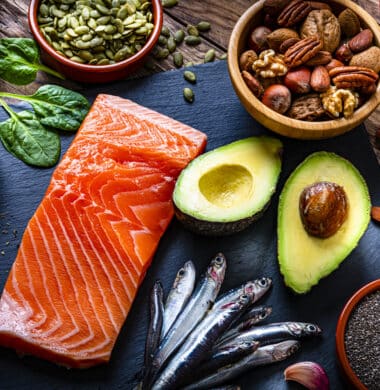The Mediterranean Diet, A Lifestyle That Is Tried And True

South Denver Cardiology has an entire team of health and prevention professionals, including highly trained Registered Dietitians. Jennifer Leone, RDN, is one of the nutrition team members and writes this article on the Mediterranean diet.
Once again, the Mediterranean Diet is named the #1 diet by US News and & World Report. The Mediterranean Diet is based on the way the people of the countries surrounding the Mediterranean Sea eat. So, naturally, there are some cultural differences. However, all have a common theme. They are all primarily plant-based in their consumption of food. The Old Ways pyramid of the Mediterranean Diet shows that most foods come from plants and plant-based protein sources. These foods are fruits, vegetables, beans, whole grains, nuts, seeds, herbs, and spices. Animal protein sources are primarily from fish or shellfish, which is consumed often, at least two times a week. In addition, poultry, eggs, and yogurt are consumed in moderate portions daily to weekly. Lastly, meats and sweets are consumed infrequently.
The benefits of the Mediterranean eating style were first documented in the Seven Countries Study, which looked at the correlation between diet and heart disease for men in Greece, Italy, Japan, Finland, former Yugoslavia, the Netherlands, and the United States. The groundbreaking study was developed by Ancel Keys, a Minnesota psychologist, from 1958 to 1983. Since then, countless studies have been conducted on the benefits the Mediterranean diet provide to your cardiovascular health. For example, a study by the Journal of the American Medical Association of 26,000 women found that the participants who followed this lifestyle had 25% less risk of developing cardiovascular disease over 12 years.
Implementing the Mediterranean Diet Into Your Life

Here is an example of a vegan one-day meal plan.
Breakfast: Apple Cinnamon Overnight Oats
AM snack: 1 clementine and four tablespoons of almonds
Lunch: Chickpea & Quinoa Grain Bowl
PM snack: 1 Fruit Energy Balls and one 6-ounce container of soy yogurt
Dinner: Green Salad with Pita Bread & Hummus
Here is an example of a regular one-day meal plan.
Breakfast: Cherry Walnut Overnight Oats
AM snack: ¾ cup of raspberries and ½ cup of plain Greek non-fat yogurt
Lunch: Avocado Egg Salad
PM snack: 2 Tbsp. hummus and two medium carrots
Dinner: Dijon Salmon with Green Bean Pilaf
Check out these links from reputable sources to learn more about the Mediterranean Diet.
https://oldwayspt.org/traditional-diets/mediterranean-diet
https://health.usnews.com/best-diet/mediterranean-diet
These two websites have Mediterranean diet recipes and meal plans.
https://www.eatingwell.com/recipes/18314/cuisines-regions/mediterranean/
If you would like to learn more about the Mediterranean diet, the South Denver Cardiology Health and Nutrition team can help. To schedule a nutrition consultation with one of our Registered Dietitians, visit our website or please call 303-744-1065.
- 9 Tips to Reduce Holiday Stress - December 11, 2025
- 6 Tips for Exercising Outdoors with a Heart Condition - May 19, 2025
- Lifestyle Changes That Can Help Manage Arrhythmia - April 30, 2025
Sign Up
As with any health concerns, your specific treatment program should be discussed thoroughly with your primary care physician as well as any specialists who may need to be consulted – like a cardiologist.
Sign Up
